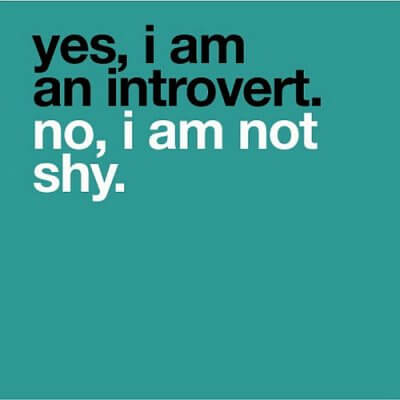Introverts in the Workplace – How Can You Cope?

By: Robert
From open space environments to team building events, modern work life is rarely geared to introverts in the workplace.
How can you navigate expectations and succeed in a workplace geared to extroverts if you are an introvert?
Are you actually an introvert?
The word ‘introvert’ is very misunderstood.
Introvert and shyness are not synonyms, nor is introvert and quiet. A person can be very quiet and have moments of shyness and very much be an extrovert. And a person who talks a lot and seems social on the surface can actually be an introvert.
Introvert vs Extrovert
The difference between introvert and extrovert is a matter of perspective and attention.
Are you outward looking? Do you put your attention on your environment, other people, group experiences? Do you crave being connected to the outward world by shared experiences and the company of others? These are extrovert traits.

By: Reedz Malik
Are you inward looking? Do you put your attention on your own thoughts and feelings and personal experiences? Are these more interesting to you than the world around you? Do you crave time to be alone with these thoughts? These are introvert traits.
Maybe not an introvert after all? Read our articles on shyness and social anxiety.
[Think you need to talk to someone? Visit our sister site harleytherapy.com to book online and phone counselling easily and quickly, worldwide.]
Struggles introverts in the workplace face
Their voice doesn’t get heard. Introverts can feel pushed out of discussions simply because they’re not making their voice heard the loudest or because they tend to think by themselves instead of with the group.
They see things through their thoughts and feelings. Introverted people are less likely to see the big picture and more likely to take things personally. This can lead to always feeling upset or misunderstood and being seen as ‘oversensitive’.
They present their ideas in ways others don’t understand. Introverts see the world through personal experience over group experience. This might mean you have a great idea but you are not connecting it to how other people see. So it ends up misunderstood and dismissed.
They can be too easily defeated. Because you see things through a lens of how you feel, you might let emotions stop you. You feel offended if a great idea isn’t heard in a meeting, so don’t bother to send it out in an email.
How to manage as an introvert in the workplace
So how can you manage if this is you?
1. Learn about perspective.
Introverted types don’t naturally see the big picture. So learning how to ‘jump perspective’ and consider what things look like from the perspective of others can be a game changer and also help you take things less personally (read our article on The Power of Perspective for more).
2. Maximise the skills you DO have.
Putting all your energy into acquiring skills that aren’t natural to you just because others around you have those skills? It’s exhausting and far less productive then figuring out your natural skills and focussing on them.
What things are you already good at? What courses could you take to make those skills your signature talents?
3. Become the best listener.

By: Dheepak Ra
Introverts spend a lot of time working to understand their own thoughts and feelings. They can transfer this to others and show a true aptitude for listening and empathy.
Note that listening is not about becoming a ‘dumping ground’ for others stress. Not at all.
Do your research and learn active listening, which is about productivity and pushing forth ideas, and is a very good tool of collaboration and business.
4. Ask for ways of collaborating that suit you.
If you find meetings in the middle of an open plan office overwhelming, ask to convene in the cafe. If you work with a team that has weekly ‘brainstorming’ sessions you find you don’t get your ideas across in, suggest you can send your ideas in advance so that they get seen.
5. Reassess your career path.
Is there a way to move from where you already are into a job that would suit you better? For example, if you are a sales manager constantly having to meet clients and it’s draining you, is there an office-based operations role that you could transition to?
6. Put yourself first and take opportunities offered.
If there is something on offer that would work better for you, don’t dismiss it just because everyone else is. For example, if nobody in your team wants to work from home for two days a week but the company offered, and you deep down know it’s right for you, take it.
Sure you are too introverted to succeed in the workplace?
Nobody is ‘just’ an introvert or extrovert. We are all more complicated than that. Jung, who was the one who created the modern concepts of introvert/extrovert in the first place, came up with eight personality types, four introvert and four extrovert. The Myers Briggs test, often used in workplaces, is based on Jung’s discoveries.
It can be helpful to take personality tests to learn about your different traits so you can harness the skills you do have, instead of feeling you can’t achieve.
If you always find yourself using the ‘introvert card’ as an excuse for workplace struggles, it might be time or a reality check. Are their other issues you are using this to hide from? Are you unhappy in the type of job you’ve chosen? Are you not sure what you want from your career?
If you feel uncomfortable talking with your manager or HR, then consider booking some sessions with a workplace counsellor. He or she will create a safe, non judgemental environment for you to get to the root of your workplace struggles. Together you can create a plan of action for making your time spent at work more enjoyable.
Harley Therapy offers workplace counselling in central London with highly experienced and trained therapists. Somewhere else in the UK or in another country entirely? Our new sister site offers affordable counselling including via online or phone.
Still have a question about introverts in the workplace? Post in the comment box below.






